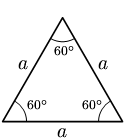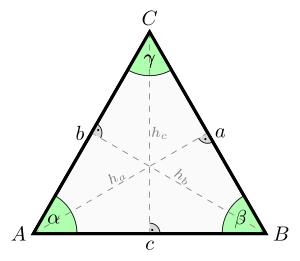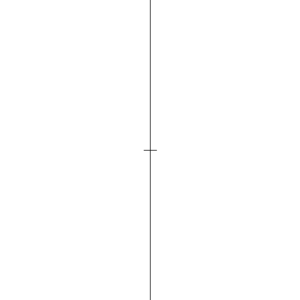Equilateral triangle facts for kids
An equilateral triangle is a special type of triangle in geometry. What makes it special is that all three of its sides are exactly the same length. Not only that, but all three of its angles are also equal. Each angle in an equilateral triangle measures 60°.
If you draw a line straight down from one corner to the middle of the opposite side (this is called an altitude), it cuts that side exactly in half. This also creates two smaller triangles, each with angles of 30°, 60°, and 90°.
Contents
Key Features of Equilateral Triangles
Equilateral triangles have many interesting properties. If we call the length of one side a, we can figure out a lot about the triangle using math.
Here are some important measurements:
- Area: The space inside the triangle is found using the formula
 .
. - Perimeter: The total distance around the triangle is simply
 (three times the side length).
(three times the side length). - Circumscribed Circle Radius: A circumscribed circle is a circle that passes through all three corners of the triangle. Its radius is
 .
. - Inscribed Circle Radius: An inscribed circle is a circle drawn inside the triangle that touches all three sides. Its radius is
 or
or  .
. - Center Point: The exact middle of an equilateral triangle is the center of both the circumscribed and inscribed circles.
- Altitude (Height): The height from any side to the opposite corner is
 .
.
We can also find the area if we know the radius of the circumscribed circle, R:
- The area is
 .
.
Many of these measurements are also related to the triangle's height (h):
- The area can be found as
 .
. - The height from the center to each side (called the apothem) is
 .
. - The radius of the circumscribed circle is
 .
. - The radius of the inscribed circle is
 .
.
In an equilateral triangle, special lines like altitudes (heights), angle bisectors (lines that cut angles in half), perpendicular bisectors (lines that cut sides in half at a 90° angle), and medians (lines from a corner to the middle of the opposite side) all meet at the same point. They are all the same lines!
How to Draw an Equilateral Triangle
An equilateral triangle is quite easy to draw using a compass and straightedge. Here's how you can do it:
Using a Line Segment
1. First, draw a straight line segment. This will be one side of your triangle. 2. Place the sharp point of your compass on one end of the line. 3. Open the compass so the pencil touches the other end of the line. 4. Swing an arc (a curved line) from that point. 5. Now, move the compass's sharp point to the other end of the line segment. 6. Without changing the compass opening, swing another arc. 7. The two arcs will cross each other at a point. 8. Finally, connect this intersection point to both ends of your original line segment. You now have an equilateral triangle!
Using Circles
Another way to draw an equilateral triangle is with circles: 1. Draw a circle with any radius you like. 2. Pick any point on the edge of that circle. 3. Place the sharp point of your compass on that chosen point. 4. Draw a second circle with the exact same radius as your first circle. 5. These two circles will cross each other at two points. 6. You can then draw an equilateral triangle by connecting the centers of the two circles and either one of the points where they intersect.
Both of these methods will also create a shape called a vesica piscis, which looks like an eye. The proof that this drawing method creates an equilateral triangle was the very first idea in Book I of Euclid's Elements, a famous ancient math book.
Images for kids
See also
 In Spanish: Triángulo equilátero para niños
In Spanish: Triángulo equilátero para niños
 | Sharif Bey |
 | Hale Woodruff |
 | Richmond Barthé |
 | Purvis Young |





